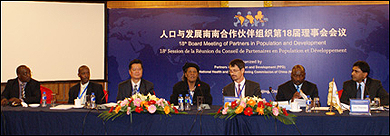| |
According to the United Nations, by 2050 there will be more people in the world who are over 60 years than children under 14. The global total is expected to rise from the current 810 million to more than 2 billion by 2050. It would be the developing countries who would have about 80% of them living there. A preliminary analysis of the situation of ageing in PPD partner countries indicated that PPD’s 27 member countries constituted 48.6 % of the world population over 60 years in 2012 and the rate is projected to increase to 57.1% by 2050. Nearly all of the member countries of PPD will have more than 10% of their population over 60 years by that 2050. Only 2 PPD member countries fall within the first 50 rankings of the Global AgeWatch Index, calculated based on income security, health status, employment, education, and an enabling environment for older people.
While increasing of longevity is a positive indicator of social, economic and technological development, the ageing population is also raising concern in developing countries. This is because of their inability and limited resources to provide social protection, health care and income security for the growing numbers of older citizens. The opportunities and challenges of ageing must be addressed by appropriate policies, budget lines and program implementation.

|
|
 |
 |
22 May, 2017
|
 |
13 March, 2017
|
 |
01 October, 2016
|
 |
23 October, 2013
|
 |
21-23 October, 2015
2015 International Seminar on Ageing, Nanjing, China
»
» [ 61 MB ] |
 |
20-22 October, 2013
|
 |
October, 2013
|
 |
 24 October, 2013 24 October, 2013
|
 |
24 October, 2013
|
| |
|
|
|
|